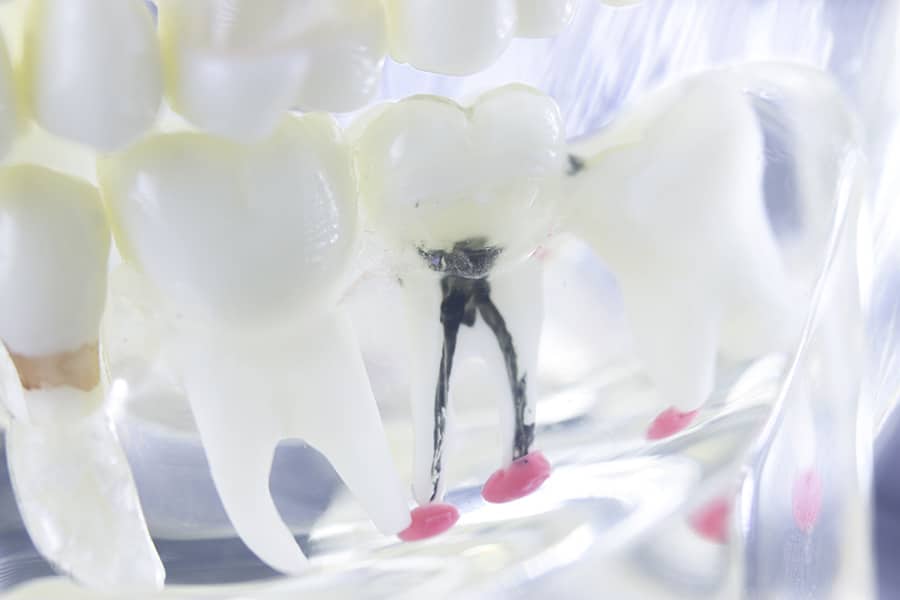Root canals can seem daunting, but they are actually a relatively common and necessary dental procedure. Root canals prevent damage to your teeth and restore your oral health. If you’re worried about needing a root canal, read on to learn what causes a root canal and the ins and outs of the root canal procedure.
What is a Root Canal?
A root canal is a common endodontic treatment done to repair infected teeth. The procedure involves removing the blood vessels and nerves inside the affected tooth. The soft tissue is then cleaned and sealed off.
What Causes a Root Canal?
A root canal becomes necessary when an infection reaches the inner tissue of a tooth, called the pulp. These types of infections are usually caused by untreated cavities that reach the tooth pulp chamber. Infections can also be spread by other infected teeth. To save the tooth, a root canal is performed. The procedure prevents infection from spreading and more damage from occurring.
Cavities can be caused by several different factors, including poor oral health or eating highly acidic foods. Even with good oral hygiene, dental cavities can occur. The infection warrants a root canal when the cavity leads to tooth decay.
What causes a root canal is not only the cavities. Other damage to the pulp chamber may allow bacteria in. Fractures or cracks in a tooth from accidents, teeth grinding, or other trauma may have similar consequences.
How Do You Know If You Need a Root Canal?
There are several symptoms that you may need a root canal. Here are seven common signs that you may have an infected tooth.
1. Persistent Tooth Pain
One of the most common symptoms of damaged teeth is persistent pain. If you have tooth pain that lasts for an extended period of time, you’ll want to consult a dentist immediately.
2. Tooth Sensitivity Towards Heat and Cold
One of the symptoms of tooth decay is extreme sensitivity to heat and cold temperatures. However, tooth sensitivity doesn’t always mean a root canal is needed. It can also be a symptom of other dental problems, including cavities. Consult a dentist if you are experiencing uncomfortable sensitivity towards hot or cold.
3. Discoloration of Tooth
Bacteria on a tooth can cause dark spots or discoloration to appear on the surface of the tooth. This can be a sign of a cavity or an infection.
4. Swollen Gums
When there’s damage to a tooth, the infection can irritate your gums. Often, this causes swollen or tender gums.
5. Pain in the Tooth While Eating
Damage to a tooth’s nerves can be extremely painful. A damaged area tends to become further irritated after chewing or biting. If you’re experiencing pain in a tooth during and after eating, it could be a sign that you need a root canal treatment.
6. Chipped or Cracked Tooth
If a tooth is cracked or chipped all the way to the pulp chamber, bacteria could be let in and cause inflammation or infection. If you notice a crack or a chip in your tooth, speak to a dentist to correct the issue. In some cases, you may correct the problem before a root canal becomes necessary.
7. Loose Tooth
Infected teeth will start to decay, causing the tooth to become loose. A loose tooth can be a symptom of tooth decay, so speak to a dentist immediately to assess the area.
Root Canal Procedure
The actual procedure of a root canal is simple. First, your dentist will remove the damaged nerves and tissue from inside the infected pulp chamber. Next, the area inside the tooth’s interior is cleaned and disinfected. A crown is then placed on top of the restored tooth for further protection.
Is a Root Canal Painful?
Before starting the procedure, your dentist or endodontist will administer a local anesthetic to prevent any feelings of pain. The root canal will not be any more painful than other dental procedures, but you may experience some discomfort for a few days after the procedure.
While the procedure may be uncomfortable, root canals will help to prevent dental pain from an infected or damaged tooth.
How Much Does a Root Canal Cost?
A root canal’s cost varies depending on how complex the problem is. It will also be more expensive if you need to correct multiple teeth. Most dental insurance plans will cover the cost of a root canal, but you can consult your dentist for an exact estimate of what the procedure will cost.
Do You Need a Root Canal Specialist?
Are you looking for a root canal specialist? Contact East Valley Dental Professionals by calling 480-838-3033.

